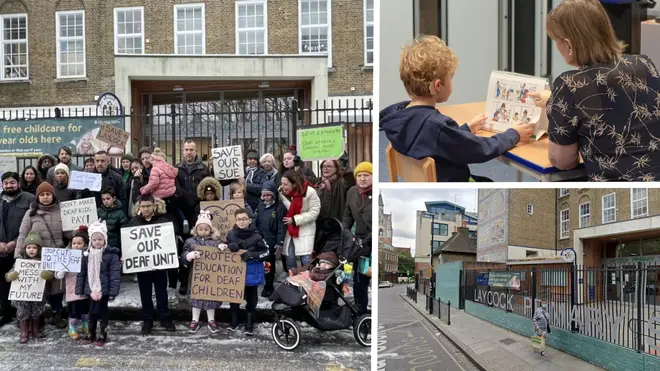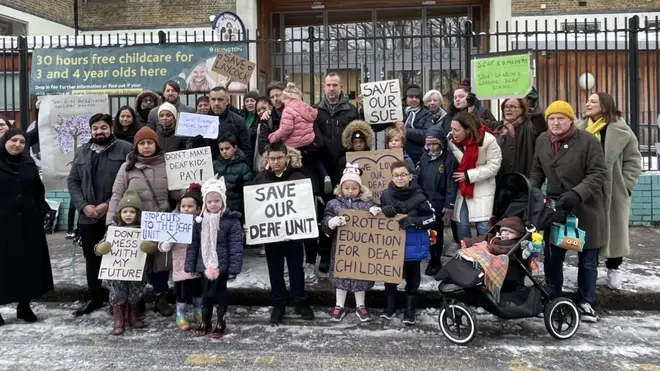
James O'Brien 10am - 1pm
15 December 2022, 06:26 | Updated: 16 December 2022, 00:43

The number of specialist teachers supporting children with hearing difficulties in England has fallen to its lowest level on record - with fears rising school bills will add to the problem, LBC has learned.
The Consortium for Research into Deaf Education (CRIDE) has revealed 1 in 5 "teachers of the deaf" posts have been lost in the past decade.
But as school leaders look to tighten their budgets further, with increasing financial pressures, there are concerns more specialist posts will be scrapped, to make sure there's enough money to heat classrooms.
In North London, one of the country's leading deaf provisions at Laycock Primary School is the latest to see potential staffing cuts to help balance the budget.
The headteacher has suggested cutting leadership roles in the specialist unit - which supports up to 68 deaf pupils - to save around £125,000 a year.
In an official document, seen by LBC, Amy Lazarczyk said rising energy bills were partly behind why she was making the proposal.
Read more: Five more complaints into Dominic Raab's conduct under investigation

"Additional challenges mean the school currently has forecast a deficit of approximately £234,000," she said.
"This is expected to increase to £295,000 at the end of this financial year, if left unchecked. This has increased from previous forecasts as it is taking into consideration energy prices, staffing pay increases, short term redundancy costs, continued falling roll."
The proposal - which is going through a consultation period with staff - is to scrap the deaf unit’s deputy headteacher role and the audiology leader position (who is in charge of hearing aid maintenance).
Islington Council says it’s trying to find a solution that doesn’t compromise the quality of the curriculum. Parents are fighting against the cuts, saying it would be devastating for their children’s’ education.
Marcus Evans’ son William is a pupil at Laycock Primary School and he told LBC News: “Being deaf is a disadvantage enough without having people playing with his future just because they want to balance the books - this is running a school by spreadsheet and these kids have specific educational needs, I have very deep worries about it.”
The proposals would see pupils from the deaf provision being integrated into more mainstream classes at the school, which run alongside the unit.
Another parent, Giulia Bove, says her son has autism and ADHD as well as being profoundly deaf and told us: “If my son was in a mainstream school, he would not survive that type of environment and would definitely fall behind.
"For me and my kids, the support provided by the deaf unit at Laycock means everything to us.”
Figures from CRIDE show the number of specialist deaf teachers has fallen over the past year for the eighth time in a decade, with a prediction just 727 teachers of the deaf will be left in England by 2030.
There were 1,063 in 2012.
Mick Hobday from the National Deaf Children's Society told LBC he fears if schools like Laycock Primary in Islington go ahead with cuts to specialist staff, in order to save money, it could set a precedent for others to follow suit.
He said: "We very much hope that Laycock will be a one-off, that there won't be proposals to cut the quality of education for deaf children anywhere else, but we have to recognise this is a very difficult economic situation.
"There's no reason why deaf children can't do just as well as their hearing friends at school but they do need extra support to develop in an effective way, so of course we're worried some of that support might be cut back in these financial changes.
"Wherever deaf children are being supported and educated across the UK, the National Deaf Children’s Society will be there to stand up for their rights."
A number of other charities, supporting children with autism and other additional needs have also told LBC they're concerned about support being made redundant to save cash.
A spokesperson for the Disabled Children's Partnership said: "All too often as schools struggle to balance their budgets it is children with special educational needs who suffer as specialist support is withdrawn."
Parents at Laycock Primary are fighting against the proposed cuts and have gained the support of Love Island star Tasha Ghouri and actress Rose Ayling-Ellis who used her appearance on Strictly Come Dancing last year to raise awareness of deaf education.
An Islington Council spokesperson said: "We are determined to give every child and young person in Islington the best start in life, including an excellent education, as we work to create a more equal future.
"Like many schools across the country, Laycock Primary School is responding to increased financial pressures, and is looking for solutions that ensure that the quality of the curriculum is not compromised."